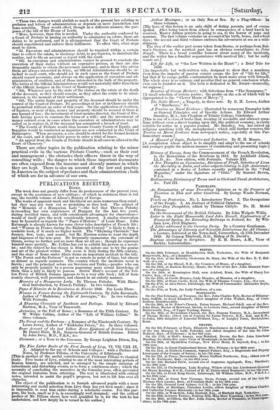Thise two changes would abolish so much of the present
law relating to bates and letters of administration as depends on mere jurisdiction and notabilia. They would effect, though in a different manner, the pur- poses of the bill of the House of Lords.
"More, however' than this is needed. Under the authority conferred by a Court of Probate in issuing an authority to administer an estate, there are duties to be performed, and it is all-important that the Court of Probate should superintend and enforce their fulfilment. To effect this, other steps must be taken.
"3d. Executors and administrators should be required within a certain time to collect the estate, to discharge debts, to pay legacies, to distribute the residue and to file an account or report with the court.
"4th. As executors and administrators cannot be pressed to conclude the execution of their duties without an expensive process, as they are also frequently unable to obtain the necessary assistance and as those who advise them are always interested in delay, an Official Administrator should be at- tached to each court, who should act in such cases as the Court of Probate should regard necessary, and always on the application of executors and ad- ministrators, of creditors, and of those interested in the bulk of the property. The duties of the Official Administrators would not materially differ from those of the Official Assignee in the Court of Bankruptcy.
"5th. Whatever may be the state of the claims on the estate at the death of the deceased, so they should remain, as they affect the estate to be admi- nistered, to the moment of their settlement.
"6th. The entire funds and property of the deceased should be under the control of the Court of Probate. No proceedings at law or in Chancery should be permitted without an order of this court. On the application of creditors, of legatees, or next of kin, money and property should be secured if there is any hazard of loss ; the investment of trust-monies directed, the Court of Pro- bate having power to construe the terms of a will; and the investment of money ordered even in cases where the executors or administrators may be called on to replace it, if the deceased has committed a breach of trust.
"The Courts of Probate would thus become County Courts of Equity, and Inquiries would be conducted as inquiries are now conducted in the Court of Bankruptcy. When necessary, a ease should be stated for the formal decision of the court, and it should have power to order a trial of issues. "An appeal from the Courts of Probate should in all cases be allowed to the Court of Chancery."
There are other topics in the publication relating to the minor practical evils in the various Probate Courts,—such as their cost and management ; the obstacles their officers throw in the way of consulting wills ; the danger to which those important documents are often exposed from the insecure and slovenly manner in which they are kept. There is also an account of the law and practice in America on the subject of probates and their adminii it:ration ; both of which are far in advance of our own.
























 Previous page
Previous page